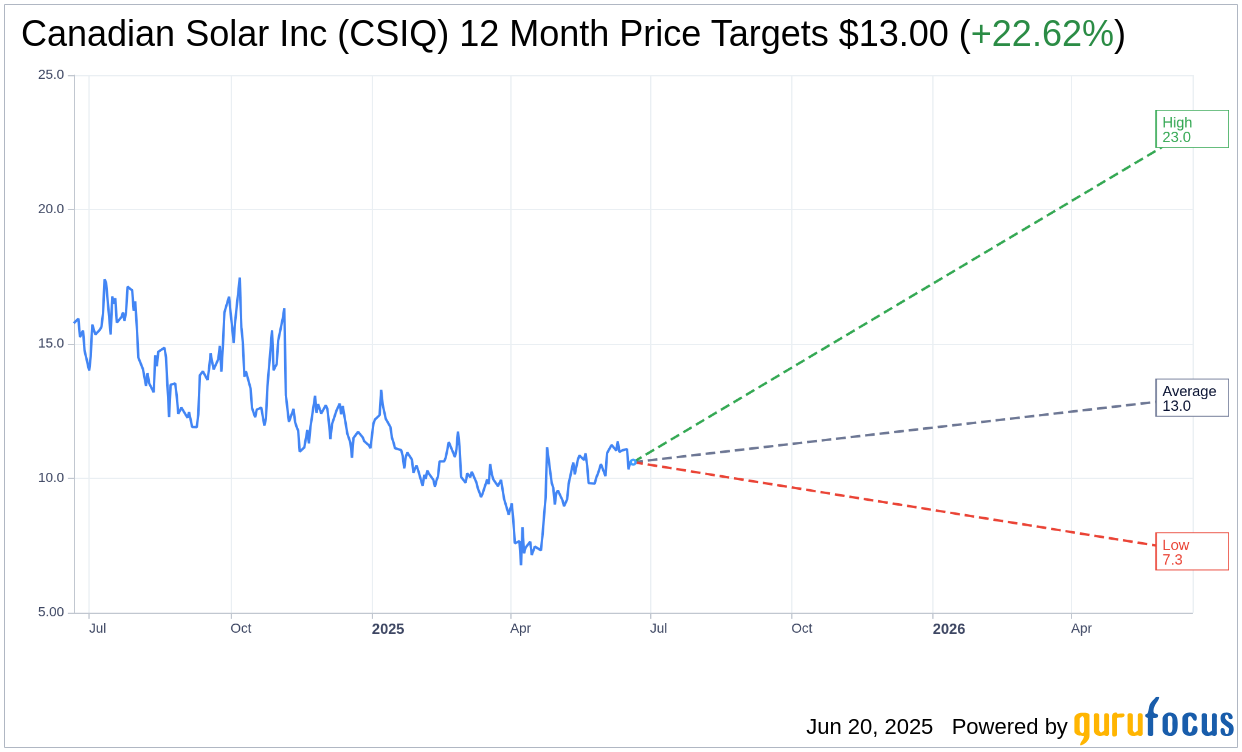Canadian Solar (CSIQ, Financial) successfully concluded its Annual Meeting of Shareholders on June 20, 2025. During the meeting, all proposals submitted for approval received the green light from shareholders. Key approvals included the election of Shawn Qu, Yan Zhuang, Harry E. Ruda, Andrew Wong, Lauren Templeton, Leslie Li Hsien Chang, and Yuan Yuan Zhang Qu as directors, who will serve until the next annual meeting or until successors are appointed.
Additionally, shareholders re-appointed Deloitte Touche Tohmatsu Certified Public Accountants LLP as the company’s auditors for the upcoming year. They also granted the directors the authority to decide on the auditors' remuneration, ensuring continuity in the company's auditing process. This strategic alignment illustrates Canadian Solar's commitment to maintaining its governance and operational standards.
Wall Street Analysts Forecast

Based on the one-year price targets offered by 9 analysts, the average target price for Canadian Solar Inc (CSIQ, Financial) is $13.00 with a high estimate of $23.00 and a low estimate of $7.28. The average target implies an upside of 22.62% from the current price of $10.60. More detailed estimate data can be found on the Canadian Solar Inc (CSIQ) Forecast page.
Based on the consensus recommendation from 11 brokerage firms, Canadian Solar Inc's (CSIQ, Financial) average brokerage recommendation is currently 2.7, indicating "Hold" status. The rating scale ranges from 1 to 5, where 1 signifies Strong Buy, and 5 denotes Sell.
Based on GuruFocus estimates, the estimated GF Value for Canadian Solar Inc (CSIQ, Financial) in one year is $21.23, suggesting a upside of 100.28% from the current price of $10.6. GF Value is GuruFocus' estimate of the fair value that the stock should be traded at. It is calculated based on the historical multiples the stock has traded at previously, as well as past business growth and the future estimates of the business' performance. More detailed data can be found on the Canadian Solar Inc (CSIQ) Summary page.
CSIQ Key Business Developments
Release Date: May 15, 2025
- Revenue: $1.2 billion, at the high end of the forecast range.
- Gross Margin: 11.7%, modestly exceeding expectations.
- Net Loss: $34 million or $0.69 per diluted share.
- Module Shipments: 6.9 gigawatts, slightly above guidance.
- Energy Storage Shipments: 849 megawatt hours, in line with expectations.
- Operating Expenses: Decreased 4% year-over-year, driven by lower shipping costs.
- Net Cash Flow Used in Operating Activities: $264 million, primarily due to increased inventories and project assets.
- Total Assets: $13.9 billion, driven by investments in project assets and solar power systems.
- Capital Expenditures: $256 million in the first quarter, primarily towards US manufacturing initiatives.
- Cash Balance: $2.0 billion at the end of the quarter.
- Total Debt: $5.7 billion, reflecting borrowings for capacity extension and project development.
For the complete transcript of the earnings call, please refer to the full earnings call transcript.
Positive Points
- Canadian Solar Inc (CSIQ, Financial) achieved module shipments of 6.9 gigawatts, slightly exceeding guidance.
- Revenue reached $1.2 billion, hitting the high end of the forecast range.
- The company launched new solar and energy storage products, showcasing technological leadership.
- Canadian Solar Inc (CSIQ) secured a $450 million multi-currency credit facility to support global expansion.
- The company has a strong energy storage pipeline of 91 gigawatt hours, indicating robust future demand.
Negative Points
- Canadian Solar Inc (CSIQ) reported a net loss of $34 million, impacted by lower contributions from storage and tariffs.
- Gross margin declined by 730 basis points year-over-year due to lower module ASPs.
- The company faces challenges from structural overcapacity and fierce competition in the solar supply chain.
- Ongoing US-China tariff negotiations create uncertainty, affecting energy storage business expectations.
- The company reduced its full-year module volume guidance due to strategic reductions in less profitable markets.
